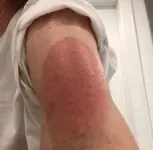The first global assessment of the impact of COVID-19 on paediatric cancer care reveals that paediatric cancer care was affected at more than three quarters of surveyed hospitals (78%).
Almost half (43%) reported diagnosing fewer new cases than expected, while around one third (34%) reported a rise in the number of patients who abandoned treatment. The survey also found that nearly one in ten (7%) closed their paediatric cancer units completely at some stage during the pandemic. Of the 15 units that closed, 13 (87%) were in LMICs, and mean closure time was 10 days.
COVID-19 has placed huge pressures on hospitals and healthcare systems around the world. Previous studies have reported delays in the presentation and care of paediatric cancer patients during the pandemic at the national or regional level. The survey published today adds the views of health care workers from around the world on the care their hospitals are able to deliver.
Daniel Moreira, M.D., of St. Jude Children's Research Hospital, USA, said: "Our findings suggest that COVID-19 has had a greater impact on childhood cancer care globally than single-region studies had suggested, with centres in LMICs particularly hard hit. Hospitals in LMICs were under strain even before the pandemic, with fewer resources and less access to care for children with cancer, so our results seem to reflect the relative strength of different healthcare systems around the world." [1]
Wide-ranging impacts were identified worldwide, including reductions in available clinical staff, paediatric cancer beds and personal protective equipment (PPE). However, the results suggest the effects in LMICs were more pronounced, with changes to chemotherapy due to treatment agent shortages, treatment abandonment, and disruptions to radiotherapy among issues frequently reported.
The authors of the new study assessed the global impacts of COVID-19 on childhood cancer care by designing a cross-sectional survey that was distributed to hundreds of healthcare workers worldwide through international and regional networks. The survey covered the period from June 22nd to August 21st, 2020, and included a range of questions to assess hospital characteristics, the number of patients diagnosed with COVID-19, and disruptions and adaptations to cancer care.
The survey was completed by 311 healthcare workers at 213 institutions in 79 countries. Countries were grouped as low-income, lower middle-income, upper middle-income, and high-income. Responses were analysed at the institutional level.
Most hospitals (83%) were in LMICs and the vast majority (88%) were able to test for COVID-19. The authors found that effects of the pandemic on paediatric cancer care were largely independent of the number of COVID-19 cases in individual hospitals or at national levels.
The findings suggest that paediatric cancer care globally has been affected by COVID-19, with more than three quarters of hospitals (78%) reporting some impact on their capacity to provide care.
Considerable disruption to cancer diagnosis was reported, with almost half of hospitals (43%) diagnosing fewer new cases than expected. Effects on hospitals' ability to provide cancer treatment were also noted, with one in three (34%) reporting a rise in the numbers of patients whose therapy did not begin or was delayed by four weeks or longer - known as treatment abandonment.
Several impacts on the management of paediatric cancer were reported, including a reduction in surgery at most hospitals (79%). More than half noted shortages in blood products, while a similar proportion modified chemotherapy because of treatment agent shortages (60% and 57%, respectively). Disruption to radiotherapy was also considerable, with almost one third (28%) reporting treatment disruption.
Hospital resources were significantly affected, with one third (32%) noting decreased financial support, while two thirds (66%) reported a reduction in available clinical staff. Around one in five hospitals (19%) noted a reduction in availability of paediatric cancer beds.
Nearly one in ten hospitals (7%) had to close their paediatric cancer unit completely at some point, with an average period of closure of 10 days. The vast majority of these (87%) were in LMICs, and while some impacts on paediatric cancer care did not vary based on country income level, LMICs were disproportionately affected in a number of areas.
This included changes to chemotherapy due to treatment agent shortages (40%, 45%, and 40% for low-income, lower middle-income, upper middle-income countries, respectively, compared with 11% for high-income), higher rates of treatment abandonment (38%, 52%, and 33% for low-income, lower middle-income, upper middle-income, respectively, compared with 8% for high-income), and more frequent disruptions to radiotherapy (78%, 68%, and 46% for low-income, lower middle-income, upper middle-income, respectively, compared with 10% for high-income).
Hospitals in LMICs also reported decreased access to life-saving interventions more frequently (8%, 33%, and 16% for low-income, lower middle-income, upper middle-income, respectively, compared with 3% for high-income), and unexpected deaths (31%, 36%, and 13% for low-income, lower middle-income, upper middle-income, respectively, compared with 8% for high-income).
Hospitals in LMICs were also more likely to report decreases in their usual government funding for cancer care (15%, 52%, and 31% for low-income, lower middle-income, upper middle-income, respectively, compared with 8% for high-income).
Dylan Graetz, M.D., of St. Jude Children's Research Hospital, USA, said: "The long-term impacts on childhood cancer outcomes are not yet clear. Our findings highlight the need for ongoing assessment of resource needs during the pandemic and the sharing of successful strategies to tackle the negative effects on paediatric cancer care." [1]
Most hospitals put in place new policies and guidelines to support paediatric cancer care during the pandemic, with more than two thirds (69%) using new or adapted patient and staff safety checklists, while new processes for communication with patients and families (63%) and new guidance on essential services (56%) were also common. The authors found that many of these were well received by hospital staff and may be beneficial beyond the pandemic.
Professor Laila Hessissen, of Mohammed V University, Morocco, said: "Although the COVID-19 pandemic has created additional barriers to childhood cancer care, we have proven we are a resilient community and can translate some of the adaptations forced by the pandemic to the future of cancer care." [1]
The authors note a number of limitations. The survey results reflect only the knowledge and opinions of respondents at one stage during a fast-changing pandemic. As the survey was in English and distributed within two paediatric oncology networks, the results may not be generalizable to small, low-resource settings where staff do not speak English and are not part of these networks. The survey covered a range of topics and took around 60 minutes to complete, which may have caused survey fatigue leading to relatively high number of incomplete responses. Nonetheless, the authors believe this study captured a comprehensive description of the global effect of this pandemic on paediatric oncology care.
This report is part of the COVIMPACT study, which aims to capture the effects of the COVID-19 pandemic on paediatric cancer care. Furthermore, this work is linked to The Global COVID-19 Observatory and Resource Center for Childhood Cancer (covid19childhoodcancer.org), a collaboration of St. Jude Children's Research Hospital and the International Society of Paediatric Oncology (SIOP).
Writing in a linked Comment, Dr Soad Fuentes-Alabi, of Ayúdame a Vivir Foundation Medical Center, and National Children's Hospital Benjamin Bloom, El Salvador, says studies such as this emphasise the challenges of delivering childhood cancer care in LMICs during public health emergencies: "In low-income and middle-income countries, including in Latin America, the common issues of late diagnosis and treatment abandonment or interruptions have worsened during the pandemic."
INFORMATION:
Peer-reviewed / Survey / People
NOTES TO EDITORS
This study was funded by American Lebanese Syrian Associated Charities (ALSAC), the St. Jude fundraising and awareness organization. It was conducted by researchers from St. Jude Children's Research Hospital, University of Washington School of Medicine, and Seattle Children's Hospital, USA, Fundacion Perez Scremini-Hospital Pereira Rossell, Uruguay, Hospital Sant Joan de Déu, Spain, Mohammed V University, Morocco, Bombay Hospital Institute of Medical Sciences, India, and University College London Great Ormond Street Institute of Child Health, UK.
[1] Quote direct from author and cannot be found in the text of the Article.
The labels have been added to this press release as part of a project run by the Academy of Medical Sciences seeking to improve the communication of evidence. For more information, please see: http://www.sciencemediacentre.org/wp-content/uploads/2018/01/AMS-press-release-labelling-system-GUIDANCE.pdf if you have any questions or feedback, please contact The Lancet press office pressoffice@lancet.com



